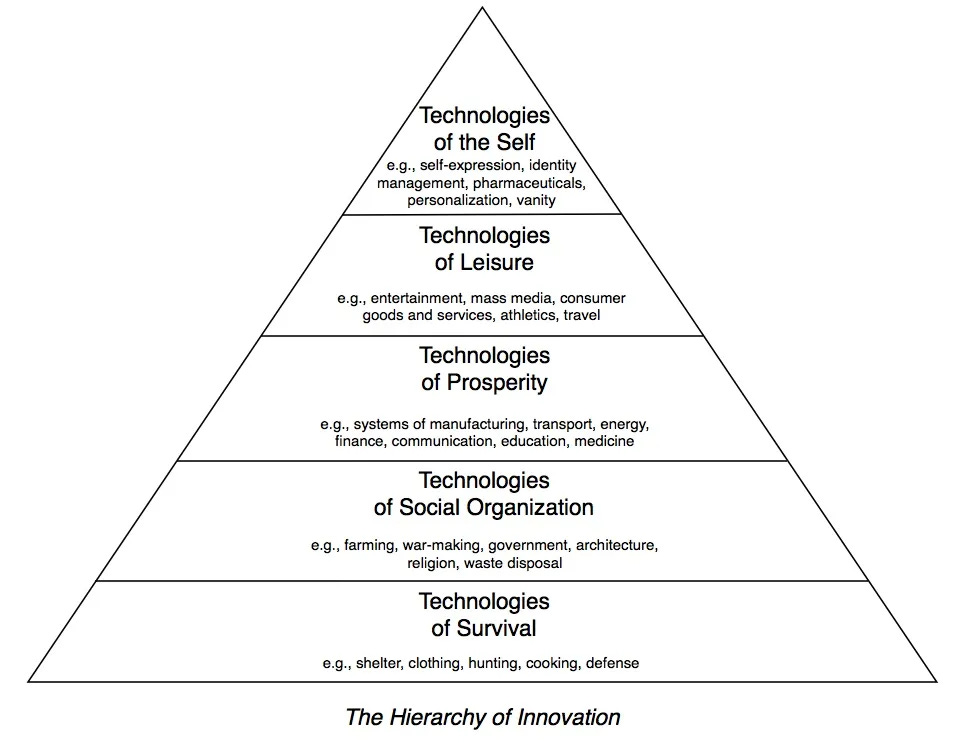Hello there,
It’s that time of the year when resolutions get broken with fierce rapidity. If you’re one of those people who didn’t get past the first 7 days of sticking to a (fake) commitment you made, don’t beat yourself up. It’s okay…you did it last year too.
Anyway, I’ve got the perfect thing to give you a nice start to the year: a bunch of 5 cracking ideas that’ll teach you something new and make you think.
Here we go:
Innovation Maslow: In the 1900s we got cars, electricity, and airplanes. But many feel that most innovation in the 21st century is only happening in the software/digital space- and that the profundity of our innovations has declined. If true, why is this happening? An interesting explanation is that as a species, we’re following Maslow’s hierarchy in the realm of innovation. First, we solved all our basic needs (health, food, shelter, etc) through innovations like agri tools, antibiotics, factory lines. Then we kept moving up, and since the rich dictate the stuff that gets invented (with their investments), most innovation is happening in leisure/self-expression…because that’s what they want. So it’s not that we’re innovating less- we’re just innovating in a different direction, and for solving different kinds of problems. (You may not be wrong in saying that solving problems of vanity and leisure are a waste of talent when billions still suffer from deprivation).
Reading Vs Scrolling: Anything that changes the brain, changes the individual, the society and the future of our species. Literacy changed our brain, allowed the individual to learn, share valuable information across other members of society and allowed our species to survive. Lack of attentiveness will also change our brain, reduce the amount of learning that happens, reduce the ‘valuable’ knowledge we share with each other and create problems for the survival of our species. Scrolling- as opposed to long form reading- may lead to shallow processing and forming convenient conclusions. We are not weighing alternatives or creating convictions of our own. This is the barrier to deep productive work that identifies and solves the problems of the world. If you’re convinced and want to develop a habit, start with these books maybe.
Chinese industrial dominance: Manufacturing doesn’t just support war — in a very real way, it’s a war in and of itself. China is projected to have 45% of the world’s manufacturing by 2030, which means it can beat the West combined in a munitions war! The West lost its production capacity because they believed in efficency- you manufacture & send us cheap goods, we’ll make SaaS and ad platforms because that’s profitable for us. But in wars, those apps aren’t any good, and it’s industrial capacity that decides the outcome- like it did in 1945, when the US’ superior industrial capacity helped the Allies win. But it seems the lessons of that deadly catastrophe have been forgotten. If things keep going this way, China is well on its way to becoming the next global gunda.
Imitation runs the world: One of the lesser-discussed truths about human nature is that we’re all imitators, constantly trying to copy others and that we desire what others desire. But nobody wants to admit that they’re just copycats- we want to believe there’s a deeper, more sophisticated reason behind our drives. That’s why busiensses try their best to gloss over this reality by using ideas like ‘trends’, and what the “tastemakers” (paid agents) are recommending. “Make them copy without making them feel shitty for copying” is a great mantra for explosive sales growth, and influencer marketing works so well because it taps into our fundamental drive to imitate.
AI Vs Human storytelling: The optimistic case for creators in the face of AGI/ASI developments is that humans may continue to flourish because of one factor: their unique lives. There are 4 components of good stories: good writing, believability, creativity and lived experience. AI is good with the first two, and not so much with creativity, but even if it gets much better it’ll not have any lived experience. So originality is our best defence as creators- most comedians and artists thrive because their work is based on their own personal experiences & observations that people relate to- something AI may not find easy to replicate. The future looks bright for those with unique personalities and styles.
That’s it for today, folks. If you enjoyed this, you’ll also really like:
The Best Ideas of 2024 [Recommended]
Some Books That’ll BLOW Your Mind [Popular]





Excellent read, thanks Sahil!
for the hierarchy of innovation you showed up, i don't think like this all happened in linearity, maybe all we needed back then was a humming tune or some banging sound in rhythm to soothe ourselves after fulfilling our stomach.
Even the technology of social organisation, we may not have said 'religion' but we lived in togetherness without having an idea of organisation. btw, self expression is not a technology, in fact i didn't get all of the top things how can it be considered "tech".